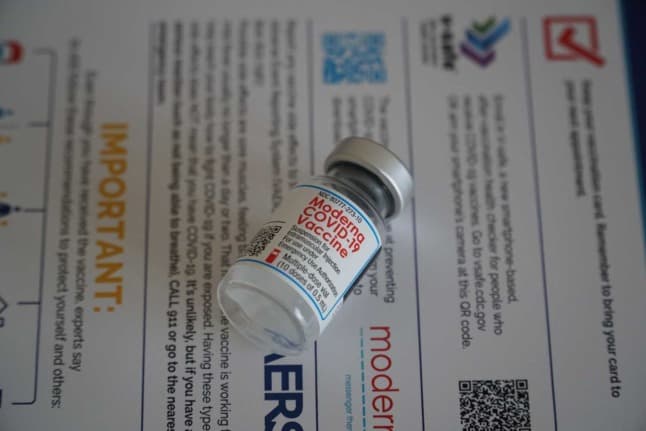Unvaccinated 'three times more contagious' than vaccinated in Switzerland

Switzerland’s Covid task force has released a range of statistical findings about the transmission of the virus, including the fact that those who have not been vaccinated against Covid are three times more likely to infect others.
Switzerland’s Coronavirus Task Force on Thursday released a range of findings about the transmissibility of Covid-19 ahead of the planned rollout of booster shots across the country.
The findings showed the degree to which vaccination prevents further transmission.
Those who have been vaccinated are three times less contagious than those who have not had the jab.
Polling: Covid-19 law looks set to win approval of Swiss voters
The findings dispel one of the more pervasive myths about the virus which has been circulating since the start of the vaccination campaign, i.e. that the vaccinated and the unvaccinated are just as likely to transmit the virus and infect others.
The false claim has often been used by Covid sceptics as a reason why vaccines are ineffective.
Based on these findings, the Task Force said at least 10,000 hospitalisations could be avoided across the country were the remaining vaccine holdouts to get the jab.
The findings also illustrated that booster shots would prevent an additional 10,000 to 20,000 hospitalisations.
ANALYSIS: Will Switzerland’s sluggish booster shot rollout worsen the pandemic?
The study took into account infectiousness of people who are fully vaccinated with the Biontech/Pfizer vaccine.
While the study looked primarily at how infectious vaccinated people are in comparison to the unvaccinated rather than the reasons, the Task Force said the most likely explanation was that those who have been vaccinated have a lower viral load, or that they are contagious for a shorter period of time.
Who is Switzerland’s National Covid-19 Science Task Force?
The Swiss National Covid-19 Science Task Force advises public bodies on appropriate courses of action to take during the pandemic, but does not directly make policy decisions.
The body is made up of 25 scientists in relevant specialised fields who volunteer to be a part of the program.
One of its main jobs since the start of the pandemic has been to dispel conspiracy theories and fake news about the virus and the government’s response.
💉Science is still celebrating National Vaccination Week! These powerful vaccines aren’t interested in your DNA.
➡️ Get your vaccine today! #Impfwoche #CoronaInfoCH pic.twitter.com/jKLH0jhCod
— Scientific Advisory Panel COVID-19 (@SciAP_Covid19) November 18, 2021
Comments (1)
See Also
Switzerland’s Coronavirus Task Force on Thursday released a range of findings about the transmissibility of Covid-19 ahead of the planned rollout of booster shots across the country.
The findings showed the degree to which vaccination prevents further transmission.
Those who have been vaccinated are three times less contagious than those who have not had the jab.
Polling: Covid-19 law looks set to win approval of Swiss voters
The findings dispel one of the more pervasive myths about the virus which has been circulating since the start of the vaccination campaign, i.e. that the vaccinated and the unvaccinated are just as likely to transmit the virus and infect others.
The false claim has often been used by Covid sceptics as a reason why vaccines are ineffective.
Based on these findings, the Task Force said at least 10,000 hospitalisations could be avoided across the country were the remaining vaccine holdouts to get the jab.
The findings also illustrated that booster shots would prevent an additional 10,000 to 20,000 hospitalisations.
ANALYSIS: Will Switzerland’s sluggish booster shot rollout worsen the pandemic?
The study took into account infectiousness of people who are fully vaccinated with the Biontech/Pfizer vaccine.
While the study looked primarily at how infectious vaccinated people are in comparison to the unvaccinated rather than the reasons, the Task Force said the most likely explanation was that those who have been vaccinated have a lower viral load, or that they are contagious for a shorter period of time.
Who is Switzerland’s National Covid-19 Science Task Force?
The Swiss National Covid-19 Science Task Force advises public bodies on appropriate courses of action to take during the pandemic, but does not directly make policy decisions.
The body is made up of 25 scientists in relevant specialised fields who volunteer to be a part of the program.
One of its main jobs since the start of the pandemic has been to dispel conspiracy theories and fake news about the virus and the government’s response.
💉Science is still celebrating National Vaccination Week! These powerful vaccines aren’t interested in your DNA.
— Scientific Advisory Panel COVID-19 (@SciAP_Covid19) November 18, 2021
➡️ Get your vaccine today! #Impfwoche #CoronaInfoCH pic.twitter.com/jKLH0jhCod
Join the conversation in our comments section below. Share your own views and experience and if you have a question or suggestion for our journalists then email us at [email protected].
Please keep comments civil, constructive and on topic – and make sure to read our terms of use before getting involved.
Please log in here to leave a comment.